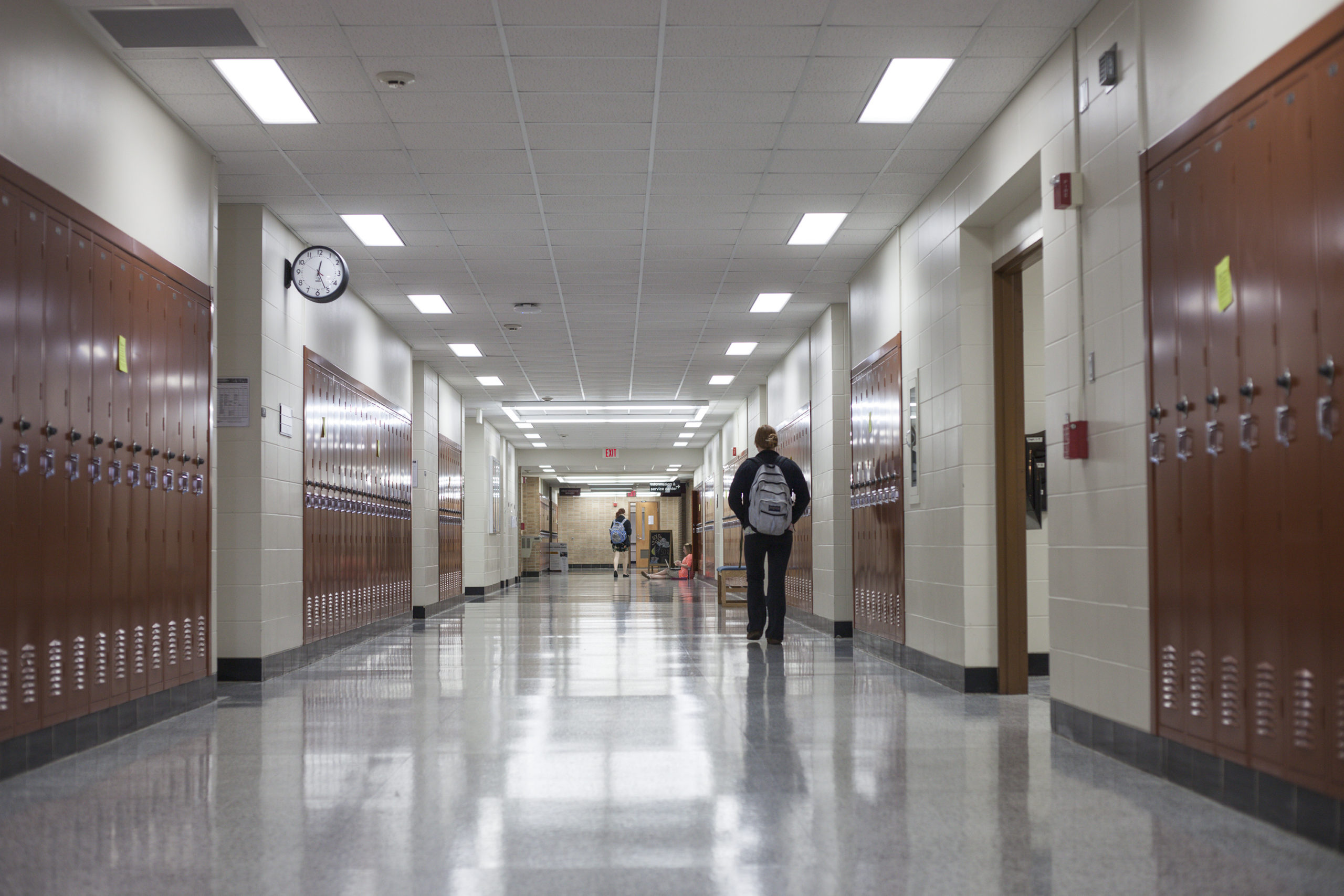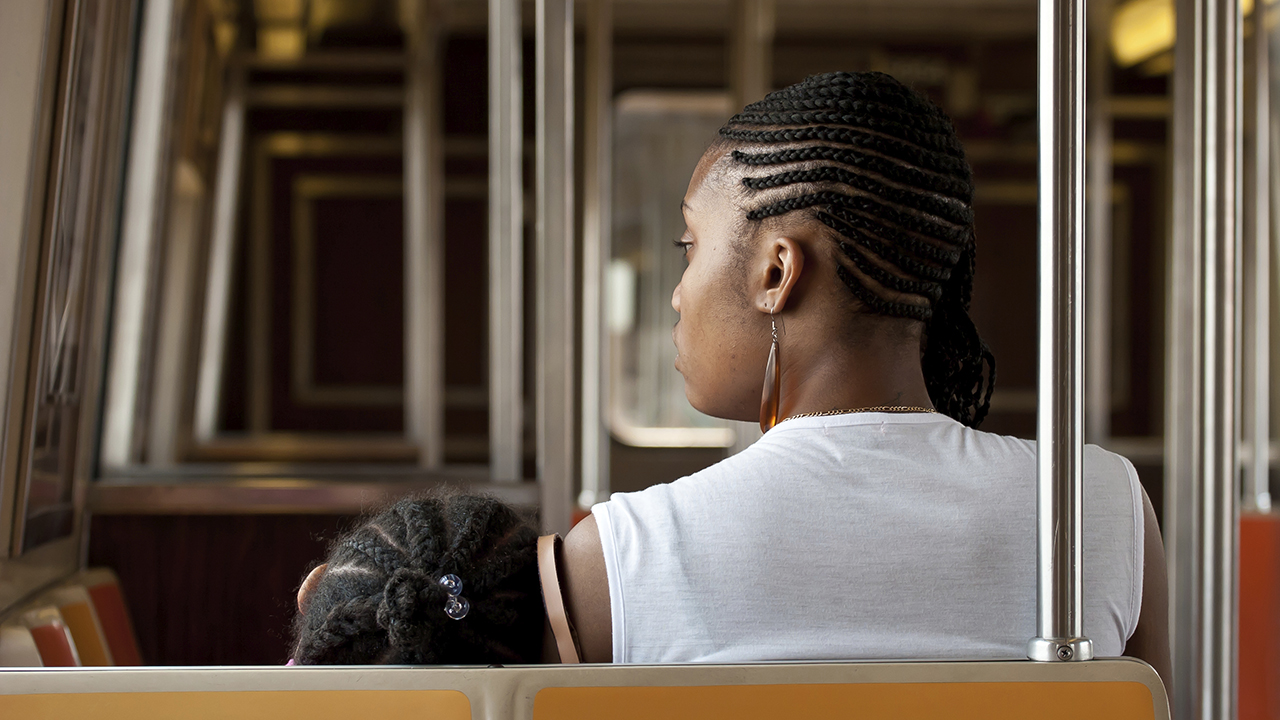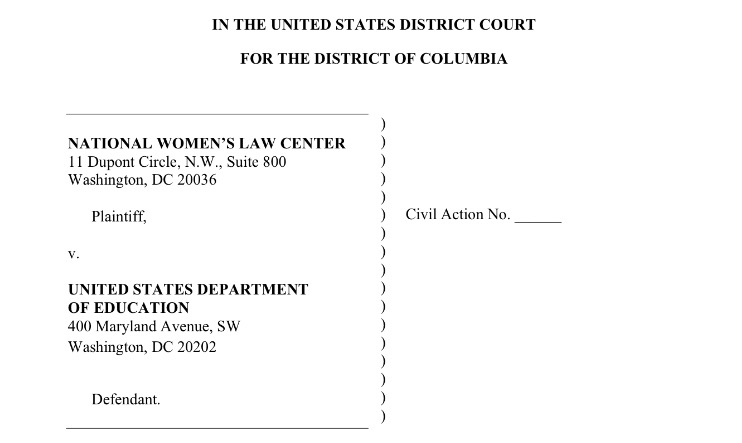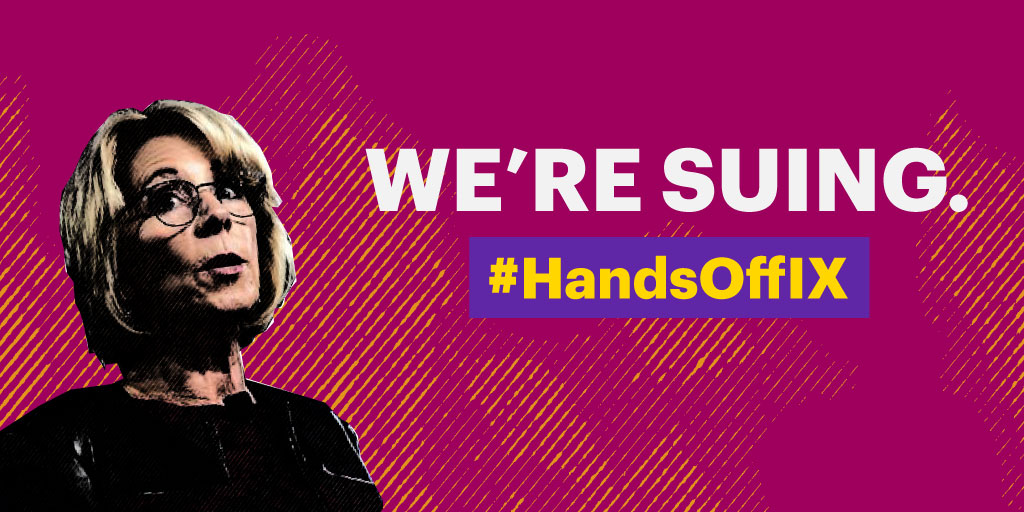Abortion rights, women of color, and LGBTQI+ people are under attack. Pledge to join us in fighting for gender justice.
Learning Alongside With Them: How Students & Staff Can Co-Create a Culture of Consent
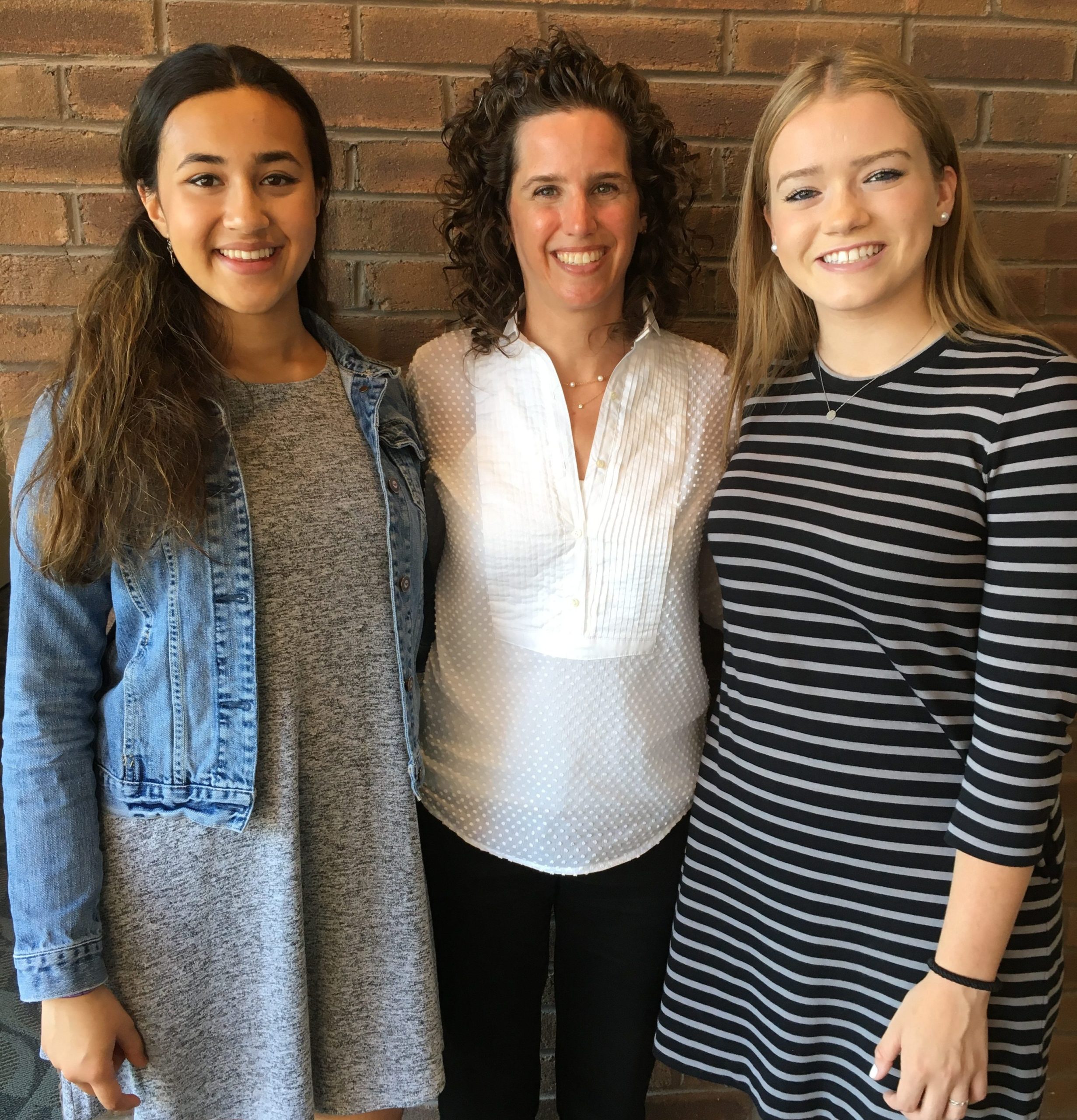
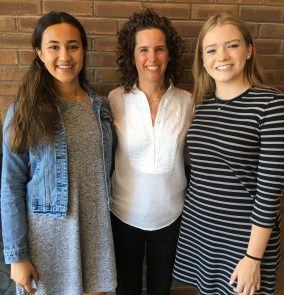 Amy Killy is a counselor at Georgetown Day School, where Tyce is a senior, and Revati is a junior. They are part of Georgetown Day’s Preventing Sexual Assault (PSA) group, a largely student-driven effort to build a schoolwide culture of consent and respect.
Amy Killy is a counselor at Georgetown Day School, where Tyce is a senior, and Revati is a junior. They are part of Georgetown Day’s Preventing Sexual Assault (PSA) group, a largely student-driven effort to build a schoolwide culture of consent and respect.
Sabrina Joy Stevens: How did you get started doing this work? What brings you to this issue?
Amy Killy: Well, as a counselor, sexual harassment and assault is an issue that comes my way all the time. I was already trying to do some work around this, and so whenever an opportunity came up, I tried to engage kids around these issues. To me, everything is all about, “How do we create this culture where we’re good to one another?” Because at the core, that’s really what this is all about. I really want us to take as many opportunities to learn and help each other understand this issue, because that helps us all get to a point where we can live with some humanity, and treat each other with some dignity and empathy.
I help run a peer leadership group for students, and together we took 40 or so people to see SLUT: The Play back in 2015. That was really successful; it was really impactful to us, and inspired some conversations and work with our peer leaders around it. From there, we decided the next fall to host a showing of The Hunting Ground. [NWLC President and CEO] Fatima Goss Graves came, as well as Dana Bolger from Know Your IX, and spoke on a panel along with two recent [Georgetown Day] graduates. At that point, I also started working with our peer leadership group and our athletic director to get players from different teams to come.
Tyce, who was a sophomore at the time, was one of the people who came to that, and was one of a small group of sophomores through seniors who came to me afterward and said, “We really want to do more about this issue! What can we do?” So we tried a couple of things to start a school-wide conversation, and quite frankly it wasn’t all that successful. But Tyce was still really interested in keeping this work going, so she said, “Who else can I talk to about this?” After that, she had coffee with Jen Klein, and from there she came back and said to me, “You know what would be really cool? What if we did a policy institute on this issue?”
We’ve done policy institutes before. At our school, policy institutes are a time when students can spend two weeks studying an issue, meeting with experts on that issue, and creating an action plan that has some kind of impact — certainly on our school community, but also on the community beyond the walls of our school. This was around our fourth year of doing policy institutes; we’ve also done them on homelessness, on refugee resettlement, on affordable housing, on veterans, and issues like that. Tyce thought it would be cool to do one on sexual assault and consent focused especially on teenagers, because so often this information isn’t getting to them. And so I of course said, “Yes, that’s a fantastic idea!” And that’s how this whole idea was born. From there, I really started looking for people who could help. I started with Dana [Bolger] and more people at Know Your IX, and re-connected with Fatima and [NWLC’s Director of Education and Senior Counsel] Neena [Chaudhry], and they each helped me find more people, and before we knew it, we had this policy institute with all these incredible people who are so inspiring, and doing extraordinary work, and I just sort of learned alongside with [the students].
Tyce: Yeah. So I got started with Slut: The Play, but then I really got started with The Hunting Ground, mainly because, ironically, The Hunting Ground is about college. I was a sophomore, and I was truly not thinking about college at all, couldn’t really even fathom being in college! But when I heard that 1 in 5 girls experiences sexual assault in college, I thought, “Well, it has to be something similar in high school, because you hear about it and you see it.” But I hadn’t really talked about it with my family or my friends. So I did a little research, I spoke with Jen Klein, and then we had the policy institute. And from there I got all this knowledge. We met all these people, we came here [to NWLC] and met with a lot of people, and by the end, all of us were saying that we felt this responsibility to tell other people all the stuff that we’d learned.
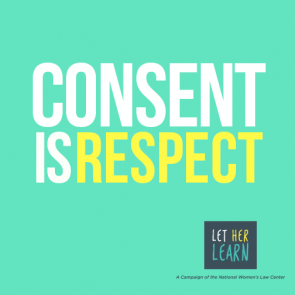
So as our action plan and culminating project from the policy institute, we decided to host a summit in the fall of 2016 for 200 students and teachers around the D.C. Metro area at our school, which happened on a Saturday last November. We had a full day of speaking, some small group sessions, a keynote speaker, some brainstorming time, and we participated in some of PAVE’s campaigns, like “#IHaveTheRightTo” and “Consent Is.”
We spent the last two weeks of our summer organizing it, and then all the way into the fall we put all the details together. That was cool, because it really was student-led all the way. [Amy] supported us to talk to all these important people, to email people like Fatima and be like, “Hi! I’m 16 and we’re doing this really cool project! Would you like to come be a part of it?” And people were like, “Yeah! I’d love to!” It was a really cool opportunity, as young people, to be able to pull adults together and pull our peers together. Revati was there, and I had some of my best friends at the summit, plus students from all over the Delaware-Maryland-Virginia region came, from all-boys schools, from all-girls schools, from Christian schools, from all types of schools, and represented a big community with all sorts of different perspectives. It was so cool. I mean, I could go on!
Revati: Yes! So I just got into GDS this past year, and at the beginning of the year I was just like, signing up for all these things that I wanted to be a part of, and I got an email that there was this summit going on. And I thought, “Oh, this is super interesting. I wonder why they’re doing it?” Usually, schools want to have nothing to do with [talking about sexual assault]. So I signed up and I just knew after the day was over that I really wanted to do the policy institute on sexual assault and consent after that. That’s how I got started.
Amy: Yes. I feel very fortunate that all these experts were willing to connect with us, because it was really important to all of us. So when we did the policy institute, we had experts who could talk about the legal advocacy piece of it, from the National Women’s Law Center. We went down and talked to Senator [Mark] Warner (D-VA) and Senator [Kirsten] Gillibrand’s (D-NY) offices, and we talked with Congresswoman [Ann] Kuster (D-NH). We also talked about the education and prevention piece of this, so we talked with Tahir [Anderson Duckett], because at the end of the last year’s institute we had someone come to us and say, “Well, I have this friend who does this work!” and so we were able to talk with him, and he was a hit of course! He’s amazing. So we talked with people like Tahir, and Debbie Roffman, who’s a nationally known sex educator, and we talked with Shafia Zaloom, who’s done a lot of really great work around this, and we also talked to Futures Without Violence, which was another big piece. And we also talked to survivors and to people who do direct service, like forensic nurse examiners, and folks at Network for Victim Recovery of D.C. and PAVE, and PAVE also brought in survivors. And there were times when people would talk about their survivor story — we had one day of just talking about that, with these [women] who were really brave and vulnerable.
And so part of it, for me, was about setting up this opportunity where kids can just learn on their own. This year we also got to go to the U.S. Attorney’s Office and talked to people there who could talk students through the whole legal piece of it, which doesn’t always fit with survivors’ experiences. All of the students write blogs throughout the policy institutes, so afterward, we had one student who wrote this beautiful blog around how it just doesn’t fit, especially when you bring in things like race, and gender, etc. the way this works through the legal system just doesn’t always fit when we’re talking about justice.
After the first year, students said, “We’re able to acknowledge and recognize that this was a pretty incredible opportunity. Like, we met with experts who are doing this work every day in really meaningful, good ways.” So many of the students were like, “Wait, why do these people want to meet with little old us?” But I think what happened was, this idea that we could help create change-makers in our world, who are good and kind, is really inspiring for us adults. I know for me, that’s my goal.
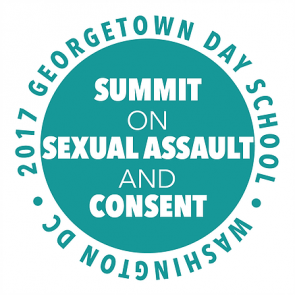
So after the first year, kids were like, “Well, we need to provide this opportunity to others.” But one of the things that they came up with was that they said, “We don’t want to open this up to just anybody. It has to be teams from schools.” They realized that individuals can come and get inspired, but if you go back into your school and you’re the only one, it’ll be hard to make change. Like, Tyce is extraordinary. She’s an extraordinary student who came forward and said, “Hey, Amy! Let’s try this! And let’s try this! And let’s do that!” But it’s like one in 500 people who would take that initiative and persist after multiple setbacks. And even so, it was much easier once that one turned into eight.
Over six months, we went from one, to eight, and from there they invited friends, so then it was like 15 people putting together the summit. Then at the summit there were 200 people, and then if those 200 people have teams and they go back into their schools, that 200 easily becomes 1,000. They also wanted there to be more students than adults, which is important because it’s important for adults to be there to shepherd kids, but they should get to do a lot of the work. So the high school teams were four students and two adults. Then this year, the big question has been “How can we broaden it? How can we make it bigger? What should we do?” And so we thought about different ways, but ultimately they came up with, “Let’s just open it up wide and see who comes, but they still have to come as teams.”
We always start off the day with survivors, because it’s really important that we focus on who and what this is really about. To really learn, and really engage, you have to bring the emotional connection to it. So we have survivors in the beginning telling their stories, and then from there we had three different sessions, and a break for lunch, as well as some time for reflection where schools could get back together and discuss. One thing we’ve done is make it so that no one from the same school are at the same sessions, so that they can bring back as much new information as possible. But we leave time for them to come back together to share and do some brainstorming before going back to their schools.
SJS: What’s your best advice for students who are interested in getting started with this kind of work, and for educators? What helped you all get interested, stay interested, and persist when your first attempt didn’t quite get off the ground?
Revati: I think, one, you have to put yourself in [a survivor’s] place and think, “What if that was me? Would I want the whole world ignoring me, or would I want someone like myself to go out and reach out?” So that’s what I think about. I feel like, if you’re someone who needs to like, have solid facts to back up something, you can look up those numbers, and it’s very easy to see that this is a huge issue.
And also, this was already all set up for me, so it was much easier to go in and get involved. I think it’s an amazing thing that Tyce did, that she’s kind of the pioneer in this. If you can be that kid in your school, think of how amazing that would be, if you’re the first one who can take that first step, and then you set up this base for everybody else, and it’s so much easier from there.
SJS: Yeah! So Tyce, how did you get to be the “pioneer?” What would you tell other students looking to get started with this kind of advocacy?
Tyce: I think that, my advice would be that students have power. All of this stuff has been a grassroots effort. We don’t necessarily have a huge program going on, but in the last two years, I’ve seen a huge cultural change within my friends, within my peers, within my classes, just by starting. And [Revati] is right — it starts with learning some facts, or knowing about it, because you can’t deny that it’s a huge problem. I think as long as we start talking about it, you really truly get people on your side. I’ve had the most heart-warming moments — and sometimes the worst moments! — but I’ve seen how people really get into this. Like, I’ve seen my friends’ dads write these letters to survivors — we did this action where we wrote survivor love letters — that say the most amazing things. And it’s true to their personalities, too. Like, one dad was like, “Dear Survivor, whoever did this to you is an insecure loser! You have power, you’re strong, and you’re not alone.” And that’s true to who they are.
But again, I’d say that students have power, and that mostly what it takes is to just start. I think sometimes, we get stuck because we’re caught on the fact that like, “We don’t have a program,” or, “We don’t have a teacher who’s necessarily a ‘sexual assault and consent’ instructor.” But we have a great counselor. So you figure it out, and you just do it. All of my friends have been supportive. I’ve had some of my best guy friends come in and really pull together and become part of this effort. And I think it’s just a matter of getting started and bringing people along for the work.
Amy: And something I’d like to add to what they’re saying too, and what I would say to educators, is that like Tyce was saying, sometimes it has been hard. Some people — both kids and adults — would be like, “Enough already.” There’ll also be kids and adults who will be like, “You’re not doing enough. You’re not fighting hard enough.” Or “You’re not fighting in the right way.” Or “You tried this and it was a really terrible idea.” There are people who will be sort of negative. And my whole thing is, “We’re not going there. It’s not beneficial to anybody.” So another thing I would recommend is to stay positive. Even with the experts that we’ve met with, one of the pieces that I’ve always taken away is that the ones who are positive, and are looking for ways to make positive change, are the ones that are more inspiring. And the ones who are just negative about other people, it doesn’t move you any place.
I think another thing is, putting the students out front, and following their lead. Like, I could come up with programming or whatever. But even though I have two teenaged kids, I don’t live the teenage life. It’s just different. As much as I might want to understand what goes on online, I — like, don’t tell anybody!– but I don’t really get it. So you’ve got to follow where they are. It’s part of what we’re always talking about, it’s Counseling 101. We meet people where they are. So I feel like that’s another reason for students to take the lead whenever possible.
But that doesn’t mean you don’t shepherd them. Because when you’re working with students, you want them to find quality information, and to deal with each other in positive ways. Sometimes there is this tendency — not so much with these two! — but there is this tendency sometimes to be like, “I have to be right, and that means everyone else is wrong!” and “You have to follow me!” So there is some shepherding that goes along with it.
I think another piece that has been really helpful to me is focusing not only on the issue, but also focusing on the process, and on reflection. As these girls know, I think thank you notes are really important. And so all summer long, we’ve been writing thank you notes, because I think there’s some important reflection that happens when you write thank you notes, and I think having gratitude makes a difference. Also, every day throughout the policy institute, someone would write a blog, so by the end, they’d each written at least one or two blogs. It’s really important to provide everyone with opportunities to be reflective.
Something else I think it’s important for educators to keep in mind is that this is not just about sexual assault. There are all these intersections with other related issues, and to ignore those intersections is to ignore the issue itself. So to not talk about gender, to not talk about race, or about sexual orientation, or socioeconomic status, or about drugs and alcohol, about social media, is to miss out on the complexity of what this issue is about. And I don’t think kids really learn, or buy into, or even understand if you try to make this into a very cut-and-dry issue. Because it’s just not. And I think particularly for teenagers, where they’re seeing this is in the hallways of their school, in the parties at their parents’ homes, and other places too. So if you talk about it in a very simplistic way, it gets away from the reality of the situation. And if it’s not real, then they’re not going to accept it. It’s not going to resonate.
Revati: And just to add, about the “positive approach” piece, I know that for me, when I told people what I was doing over the summer, they were like, “What?!” Like, “That’s a really heavy topic! You’re 16, that’s your summer? Why are you spending your summer talking about this awful thing?” And they were like, “Oh, don’t get too involved with it, be sort of on the outside.” And I was like, “Why do you think that this is what I need to hear?”
So one thing I think is important is to consider who you are as a person. I’ve found that watching things like Audrie and Daisy or The Hunting Ground, they’re obviously hard to watch. But I can get through that, and I could think about those things without getting buried in the emotion and sadness of these really sad survivor stories. So for me, it’s sort of like, “Well, if not you, then who?” right? Like, if everyone keeps saying, “Well yeah, it’s a terrible issue, but I don’t have what it takes to deal with that,” who does? Any which way you go, you’re going to have really hard problems to solve. This one has more of an emotional piece attached to it than others, but I don’t think it’s something you can avoid dealing with, with a problem that’s this big.
Amy: One other piece I’ll add to my advice is that parents are really important, and they want to be involved but they don’t always know how. I mean, I am a parent of teenage kids, and we grew up in a different time. We just did. The messages we got were different; how we were told to take care of ourselves, and our own experiences, were different. I don’t know any woman my age who hasn’t experienced some sort of sexual misconduct, whether it’s someone patting them on their butt, or catcalls, or something much worse than either of those things. But we grew up in a different time when people dealt very differently with these issues, so we don’t always know the best way to approach this. Providing opportunities for parents to be a part of what we’re doing is really important.
SJS: I love this notion of, “If not you, then who?” because I think a lot of people feel like there are so many huge problems which seem insurmountable, and that’s overwhelming, so they’d just prefer not to think about these hard things. Which, of course, never works. The bad things still happen, but we’re just unprepared for them. What feels really powerful about what you’re saying is that you’re giving people multiple ways into this issue that are very approachable, and manageable, so that they can get into it and realize, “Oh! This is a thing I can actually help solve! Like, I can help fix this!”
Amy: Yes. And to that point, I think that’s why it’s so important, during the Summit or during any of the different things that we’re doing, to dig into all these different aspects of this issue, because people can step into it in different ways. Like, this summer, we had one student who loved the legal stuff. There was someone else who really loved the survivor support stuff. There was someone who loved the policy part of it. If you give lots of openings, then people can step in wherever they feel most comfortable, and focus on what interests them.
SJS: Yes. So I wanted to go back to something Tyce said earlier, about changes you’ve seen over the course of this work, among your friends, in your school. What does that look like? What’s different now?
Tyce: It’s come up in a lot of ways. I see it a lot in my friend group, and among my peers. One of my favorite stories is related to this work we did with PAVE. They have this campaign called “Consent Is” and they have these cool bracelets that say, “Consent Is ________” and you can fill it in or you can leave it blank. We had a bake sale where if you bought a brownie or something, you could get a bracelet. And by the end of the day, someone was like, “Are you taking pictures of this?” And I was like, “No, why?” And around school, almost half of the school had them on. Which is insane. So I went around and started taking pictures, and I did little interviews for Instagram about what they thought about what consent was. At one point someone from the men’s varsity soccer team came up and was like, “Hey… Do you have any more of the bracelets? A lot of my teammates already have them but I couldn’t find you. Could I have one?”
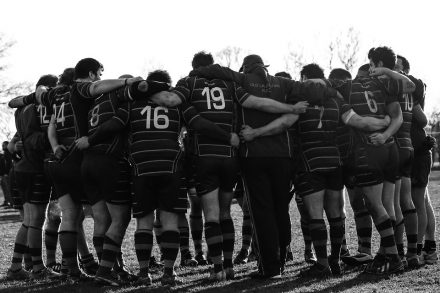 Now, let’s be honest — at that point, it had become, like, a trend. Which is fine! Like, cool, that’s how it starts! But from there, though, people still have them on. And it’s changed things in deeper ways, like the way people talk. In the last year, I’ve seen people start to call out people — like, in a very sort of low-key way, not like yelling or anything — but I’ve seen people start to be like, “Dude, what? What did you just say?” when they hear [rape] jokes or whatever. People are much more comfortable talking about it, when these issues come up. We’ve also started to get way more guys into the policy institute, and the group has become much more diverse. It’s come a long way, because people are more comfortable talking about it.
Now, let’s be honest — at that point, it had become, like, a trend. Which is fine! Like, cool, that’s how it starts! But from there, though, people still have them on. And it’s changed things in deeper ways, like the way people talk. In the last year, I’ve seen people start to call out people — like, in a very sort of low-key way, not like yelling or anything — but I’ve seen people start to be like, “Dude, what? What did you just say?” when they hear [rape] jokes or whatever. People are much more comfortable talking about it, when these issues come up. We’ve also started to get way more guys into the policy institute, and the group has become much more diverse. It’s come a long way, because people are more comfortable talking about it.
Over the past year, things have been super crazy politically, and I think that has tied into it as well. I think people find that they’re feeling more comfortable talking about this issue because they feel like they have so little control over what’s happening, so if they can have a little bit of influence over how people around them speak, and how they treat each other, and how they respect each other, I think that’s been bringing people into this conversation. I’ve found that people in my direct circle have really changed the way they speak about it in the last few years.
Amy: Do you think that’s also because it’s not in response to a specific incident, but rather because it came out of this grassroots effort? ‘Cause sometimes, I think when schools do this kind of work in response to a specific incident, people are defensive, and they take sides, and they shut down, and get scared. But what Tyce was just describing, to me, it sounds like because it was more proactive and grassroots, it was much easier to talk about and get on board because it wasn’t about having to take sides.
Tyce: Yeah. I think also, like when it’s like a project — we’ve all got independent studies, where we do our own projects — people jump onto those because it’s something concrete. We have a Preventing Sexual Assault (PSA) club, which gives people a place they can just show up. We had the bake sale, and the whole lacrosse team spent their whole afternoon — after having practice all morning! — spent four or five hours baking for this bake sale. I think that when you give people these opportunities, they jump into it, they seem more willing to do it. Just starting with little things, that give people ways to get interested, then they think, “Oh, yeah. I support preventing sexual assault!” Whereas two years ago, people didn’t even want to say those words. “Sexual assault” is a scary term, like people didn’t want to even say “sexual” out loud, whereas now people in our school feel comfortable naming it, talking about it, and dealing with it.
SJS: Yes. That speaks to one of my questions: One of the barriers to this issue is many people’s sense of shame around sex, and the related hesitation to talk about anything to do with sex, let alone the ugliest things that can happen within human sexual interactions. I think there’s definitely that pause, as a parent, like, “Should I sign this permission slip to allow my child to go to this?!?” As a teacher — I used to teach as well — it’s so hard to think about how you can even bring this up. I know you [Revati] talked about how, as a new student, you came in and were looking for things to join. How did you decide, “Oh yeah, I’m going to join Preventing Sexual Assault!” out of all the things you had as options?
Revati: [laughs] Yeah! For me, I think part of it is my family. My older sister is like, a huge feminist, and so it’s something we’ve always talked about. Like, when there’s a big sexual assault case in the news, or something happening at a university, or happening to anybody, we would always talk about it. And she would always rant about, like, misogyny and stuff. [laughs] So it was always something that I knew was wrong, and if I could do something, I would do something, but it just never came up that there was an opportunity before the summit came my way. So when it did, I thought, “Oh, this is the perfect opportunity to sign up for something, and get into something that I’m interested in.” That was sort of how I decided to join.
But as for people who don’t want to talk about sexual assault, it’s just not healthy, I think. It’s something that is happening, and trying to deny it or push it away — you just can’t. Of course you can’t force people to talk about something they don’t want to talk about. But it’s like this [gradual] cultural change, like [Tyce] was saying, where people are starting to realize what consent is, or that it’s not funny to joke about things that have to do with sexual assault and harassment. I think the only way [the culture] going to change is with people like us, doing our best to tell our friends, to explain it to them and to check them when they say things that are messed up — because sometimes I just feel like people truly don’t know. For so many people, no one has ever said anything to them a lot of the time. For people who know better, it’s our job to tell other people. And I think that’s really the only way that things are going to change.
SJS: So how have you approached this? As you’ve said, you can’t force people to talk about this. But you all have somehow managed to go from having a culture much like our broader culture, which is unfortunately very riddled with messages that promote ignoring consent and boundaries, to moving toward a culture that’s more rooted in consent and mutual respect. What did you all do that empowered your community to have conversations like this?
Amy: I think one important thing to say is that there’s no magic wand, right? There’s no formula that is definitely going to work for any one school. It’s totally about meeting people where they are, and then providing a path. I think the path in every school is going to look really different. I love the policy institute [that Georgetown Day] does, I love the Summit, but I’m not sure that would be the right way to do it at every school. But I do think this idea of encouraging students to be their best selves, and to be everyday advocates makes a difference.
I think a lot of this work is just helping students be confident in what they believe in, and giving them the tools to stand up for themselves. You [Tyce] were sharing a story on the way over, about a student in PE who came to me afterwards, too, and said, “I didn’t know what to say [during a problematic conversation] and I want to go back and say something later. How can I do that?” I think a lot of the reason we’ve had this shift, is because of individual kids who are brave enough to stand up.
So I think some of this is just going on a path, and being confident about it, and encouraging people to join. Like, with what Tyce was saying about getting the whole lacrosse team to bake — like, many of those kids, or even most of those kids didn’t sign up for the policy institute or the summit. But they wanted to be part of something that was cool and fun. So I do feel like a lot of the culture shift has not happened because we’ve done any one thing, I think it’s happened because students have been positive and engaging, not wagging their finger.
SJS: I want to come back to this “everyday advocates” idea. Talk to me about what it means to you all to be everyday advocates; how did that become part of your way of doing things?
Amy: For me, it really gets back to this core around humanity, and dignity, and empathy. I think being an everyday advocate means being reflective about who you are, and how you present your best self every day. Being an everyday advocate means stepping in where you feel comfortable. Like, I don’t think being an everyday advocate [necessarily] means going out every day and pounding the pavement, if where you feel comfortable is writing a note to your family.
I’ll give an example. At the Department of Education event, we had nine students who came, and I said, “We’re being asked if any of us would be willing to speak and read a survivor’s story.” About half of the kids were really interested in that, but half didn’t really feel comfortable. Part of Revati’s everyday advocacy is that she wanted to stand up, she wanted to be front and center and wanted to have her voice heard. My son was also in the group, but he did not want to speak. Instead, he came up with the idea of forwarding an email that had suggestions for a letter that people could write to [Education Secretary Betsy] DeVos, talking about what this issue is and why it was important to him. So he wrote this beautiful letter, and he sent it to all of our family and friends, and that’s also everyday advocacy.
For me, everyday advocacy is just standing up. It’s Tyce coming to me and saying, “Amy, what about this idea?” It’s having this group of eight kids [in the policy institute] who say, “You know what? We need to give other people this opportunity, too.” It’s them going out to their friends and saying, “Hey, do you want to help me organize this?” and suddenly that eight becoming fifteen. And it’s also having the bake sale. It’s saying, “Guess what? This is an issue.” It’s not necessarily beating people over the head, but just saying, it’s here.
And sometimes, it is standing up and saying, “Well, if not you, who?” Sometimes it is standing up in front of a large group of people and saying, “You know what? We’re not taking this anymore, and we are going to go out and make sure Betsy DeVos hears our voice.” Sometimes it is writing letters to policy makers. Sometimes it is going to rallies. Sometimes it is going to marches. Sometimes it is pounding the pavement. And it’s also talking to your family, and talking to your friends, and being at a party and saying, “You know what? That’s not cool” when you see someone doing something that could hurt someone else.
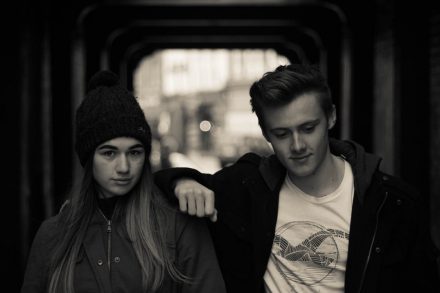 Tyce: Yeah. For me, everyday advocacy means living your truth, even when it’s hard. I can speak with adults all day long about this issue, and any adult is going to be like, “Oh, we’re so proud of you!” ‘Cause who wouldn’t, if you’re an adult? But if you’re a kid, and I’m saying, like “Sexual assault is not cool! Consent is cool!” most kids are looking at that like, “Really? Crazy lady…” I’ve had to grapple with that, and I’ve been very lucky with who I surround myself with and who supports me, and for the most part I’ve had really good feedback from my peers. But it’s not always like that. And sometimes you have to say, “That’s not cool.” Sometimes you have to be like, “Hey, you’re one of my closest friends, but I take this issue very seriously. You can’t [make rape jokes] around me.” Making that distinction for my friends has been very hard for me, and feels like putting myself out there. But I think that letting someone know what they mean to you and how what they’re saying affects you, that’s part of being an everyday advocate. It’s part of really living it.
Tyce: Yeah. For me, everyday advocacy means living your truth, even when it’s hard. I can speak with adults all day long about this issue, and any adult is going to be like, “Oh, we’re so proud of you!” ‘Cause who wouldn’t, if you’re an adult? But if you’re a kid, and I’m saying, like “Sexual assault is not cool! Consent is cool!” most kids are looking at that like, “Really? Crazy lady…” I’ve had to grapple with that, and I’ve been very lucky with who I surround myself with and who supports me, and for the most part I’ve had really good feedback from my peers. But it’s not always like that. And sometimes you have to say, “That’s not cool.” Sometimes you have to be like, “Hey, you’re one of my closest friends, but I take this issue very seriously. You can’t [make rape jokes] around me.” Making that distinction for my friends has been very hard for me, and feels like putting myself out there. But I think that letting someone know what they mean to you and how what they’re saying affects you, that’s part of being an everyday advocate. It’s part of really living it.
I think what Amy is saying about everyday advocates is exactly right, and that it’s different from people doing things just to put on their resume. Like I’m applying to college next month, and I think some people may jump on this train to get something to put on college apps or whatever. But the truth is, now that I’m looking at my apps, I don’t even know — there’s this whole movement we’ve built in our school, and I can point to that, but it’s not about that. Like, when I look back on it, and think about everyday advocacy and doing the small things — like I’m not going to put on my college apps that we did a bake sale, or that I’ve spent so many nights putting together these kits that I’m doing, or whatever it is. That doesn’t [just] go on your apps. That goes on your conscience.
Revati: Right. I think everyday advocacy is about seizing whatever opportunity we get. And if this something you really want to work on, and really want to advocate for, there are these small opportunities that open doors to bigger opportunities. So don’t think that anything you do is too small. Everything you do, counts for something.
Tyce: And just one more thing I’ll add, is if you want to make [preventing sexual assault] your thing, make it your thing. If you don’t want to make it your thing, it doesn’t have to be your thing; you can have a different thing. I think it’s important to stand up for what you believe in and treat people with respect, but this issue doesn’t have to be your main or only cause. Like, I did this week-long conference with a couple of guys in my grade. And one of them has absolutely made this his thing. Like, he’s done a bunch of projects, he has done all these things, and it’s awesome. And the other showed up, had such insightful comments, really represented our school well, but was like, “I’m more into Model UN. I’m a debater. This is not necessarily my thing, but I’m going to go back to my track team and tell them that this is important.” And that’s everyday advocacy, too.


